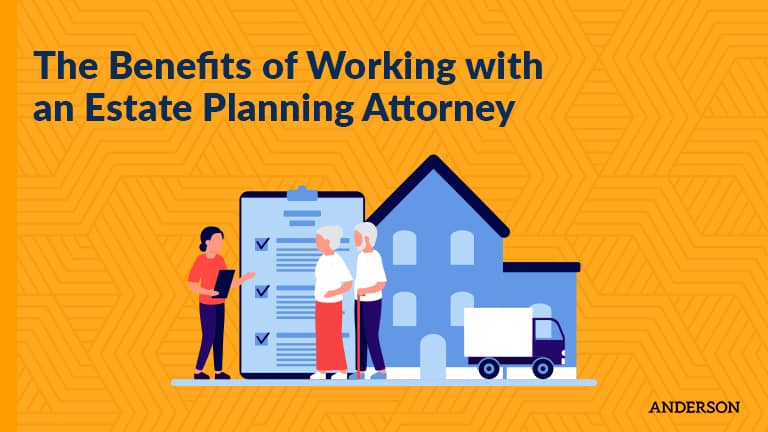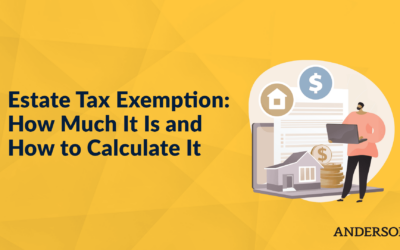
A well-organized estate plan can help ensure your assets go where you want them to at the end of your life and reduce the inheritance taxes your heirs owe. But estate planning documents can be confusing and complex. The legal documents involved include wills, trusts, and power of attorney, each with different requirements and nuances. Working with an estate planning attorney can simplify the process and provide you with the expertise — and peace of mind — you need.
Key Takeaways:
- An estate planning attorney can help you formalize end-of-life decisions and legal documents, such as wills, trusts, directives, and succession plans.
- They’ll review your assets and property, draft legal documents that adhere to your wishes, and take steps to prevent delays and extra expenses after you pass.
- As an expert in your state’s trust, probate, and tax laws, they understand how to minimize your tax burden, protect your loved ones, and keep up with changing laws.
- Working with an estate planning attorney can help you avoid probate, customize end-of-life documents, and keep essential paperwork up to date.
Tax & Asset Protection Workshop
Learn about Real Estate & Asset Protection at our next
FREE LIVE STREAM
Why Should You Work With an Estate Planning Attorney?
An estate planning attorney helps you formalize end-of-life decisions and legal documents. They can set up wills, establish trusts, create health care directives, establish power of attorney, create succession plans, and more, according to your wishes. Working with an estate planning attorney to complete and oversee this legal paperwork can help you in the following eight areas:
1. Understanding Estate Laws
Estate planning attorneys are experts in your state’s trust, probate, and tax laws. They can advise you on protecting your assets and ensure your estate is in good hands after you pass. A qualified estate planning attorney will review your assets and property, draft legal documents that adhere to your wishes, and take steps to prevent delays and extra expenses. They can also help you avoid excessive taxation on your assets, either through trusts, tax shelters, or underused income streams.
2. Avoiding Probate
Probate is the legal process of paying a deceased individual’s debts and distributing their assets. Probating an estate can be time-consuming and expensive. If you don’t have a will, the state can decide how to divide your assets among your heirs, which might not be according to your wishes. An estate planning attorney can help organize all your legal documents and distribute your assets as you wish, potentially avoiding probate.
3. Keeping Your Documents Up to Date
Many people draft estate planning documents and then forget about them. If you experience a life-changing event, such as divorce, marriage, or the birth of a child, or make a major purchase, such as property, you’ll need to update your will and trust. An estate planning attorney can review your files regularly and recommend updates to ensure they still reflect your wishes. They’ll also update your documents in case of law changes or new tax benefits.
4. Organizing Your Affairs
Your estate planning attorney keeps an up-to-date list of all your properties, bank accounts, credit cards, retirement accounts, and business agreements, ensuring a well-organized inventory of your assets is available. The attorney will also confirm which assets you own outright and which ones you co-own with another entity, along with their exact values, ensuring no confusion surrounding your ownership and assets after you pass.
5. Accurately Communicating Your Wishes
By drafting detailed documents clearly stating your wishes, estate planning attorneys can ensure no misunderstandings and prevent anyone from taking advantage of your assets. They’ll create customized documents that reflect your wishes, which general fill-in-the-blank forms and templates don’t provide. They’ll also ensure your estate planning paperwork accounts for complex scenarios, such as business partnerships or disability trusts. Your estate planning attorney will fulfill your wishes if a dispute over your assets or beneficiaries occurs after your death. They’ll interpret your end-of-life documents and communicate your wishes to skirt potential family conflicts.
6. Creating Plans for Minors
If you have children or heirs who are minors, you’ll need to name someone to be their guardian in the event of your death. A guardian cares for your children and oversees their finances until they reach the age of 18 or 21. An estate planning attorney can help you choose an appropriate guardian and include those provisions in your will.
If you don’t have a guardian in mind, the attorney might recommend appointing a trustee to oversee your assets until your children are old enough to take control. Your attorney can create a solid trust agreement that specifies who can access the assets and when the agreement expires.
7. Creating Guardianships and Conservatorships
If you’re responsible for family members — adults or minors — who can’t care for themselves physically or mentally, an estate planning attorney can help ensure their best interests if you pass away. The attorney will appoint your recommended legal guardian to manage this individual’s assets and decision-making through a guardianship or a conservatorship.
A guardianship is the appointment of another individual to make health and welfare decisions for one of your dependents. In contrast, a conservatorship is the appointment of another individual to manage the finances or personal decision-making of one of your dependents because they can’t do so themselves. Estate planning attorneys have extensive experience working with the courts to gain guardianship and can properly prepare the necessary legal paperwork.
8. Preparing an Incapacity Plan
Incapacity planning — also called a living will and health care power of attorney — is a crucial step in estate planning because it describes your wishes should you become incapacitated. An estate planning attorney can prepare an incapacity plan that dictates how you want your health care, properties, children, and finances managed if you can’t make those decisions yourself. This plan helps protect your loved ones and makes decision-making during difficult times that much easier.
Don’t Do It Alone
You might not want to think about estate planning, but it’s crucial for protecting your assets and loved ones. When you’re ready to prepare your estate, consider working with an estate planning attorney. Our team of legal and tax professionals at Anderson Advisors can guide you through asset management, end-of-life wishes, and individual circumstances. Contact us to learn more about our customized estate planning process and gain peace of mind about your future.
Free Strategy Session with an Anderson Advisor
Receive a detailed risk assessment to assist in lowering problem areas that could wipe out all of your assets with one wrong move. Speak with an Anderson Professional Advisor to get your FREE Strategy Session. Limited-Time Offer: FREE (a $750 value.)














